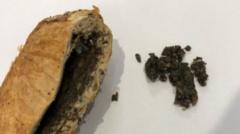Erin Patterson, a 50-year-old from Victoria, Australia, has been convicted of murder following a trial that uncovered evidence linking her to the deaths caused by toxic mushrooms in a meal she prepared. The trial revealed her attempts to hide evidence and mislead authorities, leading to widespread public intrigue.
Erin Patterson Convicted in Shocking Mushroom Murder Case

Erin Patterson Convicted in Shocking Mushroom Murder Case
Australian woman found guilty of murdering three relatives with poisoned beef Wellington.
In a case that has captivated Australia and beyond, Erin Patterson, a 50-year-old woman from Morwell, Victoria, has been found guilty of the murders of three relatives, linked to a deadly beef Wellington meal. The jury also convicted her of attempted murder of another family member who survived the meal on July 29, 2023.
The trial detailed the grim circumstances surrounding the death of Patterson's former in-laws, Don and Gail Patterson, both 70, and Gail's sister, Heather Wilkinson, 66, who succumbed to poisoning shortly after consuming food laced with death cap mushrooms. Ian Wilkinson, Heather's husband, survived the ordeal after extensive hospitalization.
Critical to the investigation was the evidence presented in court, including around 100 images released by the Supreme Court of Victoria after the ruling. These images included samples of the uneaten beef Wellington, which were analyzed for toxic mushroom traces. Analysts confirmed the presence of death cap mushrooms, known for their high toxicity and lethality.
Patterson claimed to have procured the mushrooms from an Asian grocery store in Melbourne, although she was unable to pinpoint the exact location or provide proof of purchase. Investigators, however, revealed that death cap mushrooms had been reported abundantly in two towns near Morwell, where she resided, with locals documenting sightings on the iNaturalist website—an app Patterson had used previously.
Moreover, forensic examination of Patterson’s mobile phone suggested she had traveled to those locations shortly before the meal. Notably, she had also bought a food dehydrator at that time, which later turned out to contain traces of the toxic mushrooms. Despite denying any ownership of the dehydrator, Patterson's false claims unraveled when detectives uncovered a manual within her kitchen and her history of discussing its use in an online true crime group.
Following the incident, Patterson sought medical attention under the pretext of feeling unwell, but delayed treatment for herself and her children, whom she claimed had eaten the leftovers. Tests on her children revealed no signs of mushroom poisoning.
Patterson's case not only highlights the grave dangers posed by wild mushrooms but also raises questions about accountability and the willingness of individuals to manipulate situations for personal gain. The jury’s guilty verdict reflects the serious nature of her crimes, leaving a community shaken and demanding justice in the wake of this chilling tragedy.

















